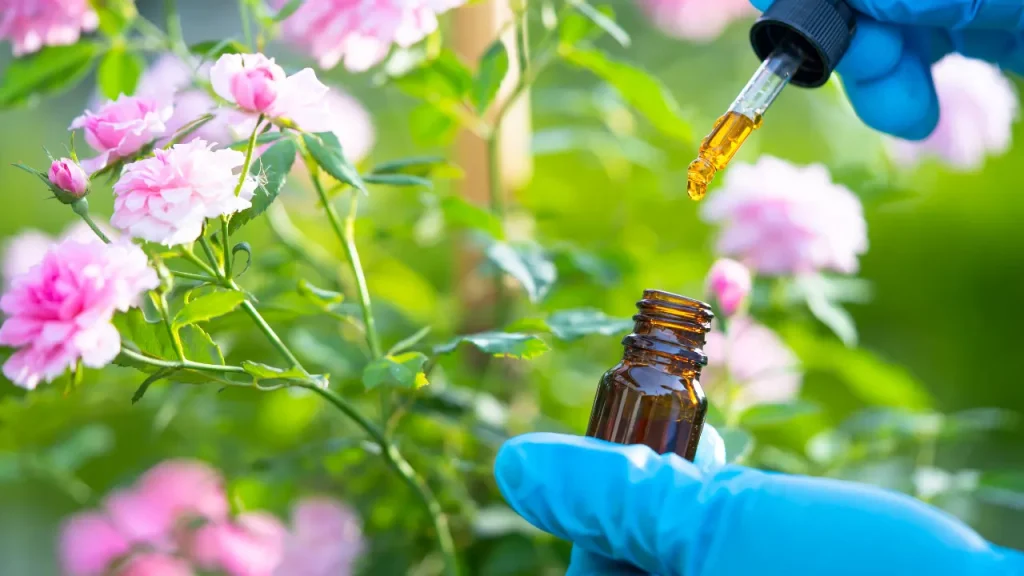The Aniba rosaeodora tree produces bois de rose oil, which has recently drawn interest for its potential health advantages and uses. Through the steam distillation of the tree’s wood shavings and chips, this essential oil, also known as rosewood oil, is obtained. Linalool and other terpenoid chemicals make up the majority of the complex blend of chemical components that make up bois de rose oil.
Since it is a natural substance, it has long been used in traditional medical procedures, especially in South America, where the Aniba rosaeodora tree is indigenous. This page explores the chemistry of Bois de Rose oil, as well as its potential health advantages, ideal dosage, side effects, potential drug interactions, and responsible use, giving both researchers and consumers a thorough grasp of this essential oil.
You May Also Like:
The Best Supplements for Brain Injury: 5 Top Brands Reviewed
Keep Your Brain Young With the 5 Most Powerful Nootropic Supplements
Rose Oil: Benefits, Dosage, Side Effects, Drug Interactions, and Other Important Information is an original (NootropicsPlanet) article.
Nature of Bois de Rose Oil
The Aniba rosaeodora tree, which is indigenous to the Amazon jungle, mainly in Brazil, Peru, and Guyana, produces bois de rose oil, a natural product. The tree’s wood shavings and chips are steam-distilled to get the oil. Bois de Rose oil has a distinctive sweet, flowery, and slightly woodsy scent. It is a yellow or pale orange liquid. Due to its distinct chemical makeup and related biological activity, it has been traditionally employed in a variety of applications, including fragrance, cosmetics, and traditional medicine.
Health Benefits of Bois de Rose Oil
- Antibacterial Activity: Research has shown that Bois de Rose oil has antibacterial activity against a variety of pathogens, such as bacteria, fungus, and viruses. Its antibacterial effect, which is ascribed to the loss of cell membrane integrity and suppression of vital cellular processes, is caused by the oil’s high linalool content. Gram-positive and Gram-negative bacteria, as well as antibiotic-resistant strains like methicillin-resistant Staphylococcus aureus (MRSA), have been successfully treated using bois de rose oil.
- Anti-Inflammatory Activity: Different in vitro and in vivo methods have been used to examine the anti-inflammatory capabilities of Bois de Rose oil. The primary component of the oil, linalool, has been found to block the activation of nuclear factor-kappa B (NF-B) and mitogen-activated protein kinases (MAPKs), hence reducing the production of pro-inflammatory cytokines like tumour necrosis factor-alpha (TNF-alpha) and interleukin-6 (IL-6).
- Anxiolytic and Antidepressant Effects: Due mostly to the presence of linalool, Bois de Rose oil has been shown to have anxiolytic and antidepressant effects. Linalool enhances GABAergic transmission and has a relaxing effect by interacting with the central nervous system’s gamma-aminobutyric acid (GABA) receptor. Additionally, the modulation of serotonin and norepinephrine neurotransmission may be responsible for the oil’s antidepressant effects.

Chemistry of Bois de Rose Oil
Monoterpenes, sesquiterpenes, and phenols make up the majority of the chemical components in Bois de Rose oil. About 80–90% of the oil is made up of the monoterpene alcohol linalool, which gives the oil its distinctive flowery and slightly woodsy scent. Other small components including -terpineol, geraniol, and nerolidol are present and contribute to the oil’s distinctive chemical profile, which may be the cause of the oil’s biological activity.
The chiral chemical linalool (C10H18O) has two enantiomers, (R)-linalool and (S)-linalool, each of which has unique biological properties. Bois de Rose oil has both enantiomers, however the (S)-linalool isomer predominates, which contributes to its unique qualities. The biological effects of linalool, which include antibacterial, anti-inflammatory, and anxiolytic properties, are well-known.
Physiological Mechanisms of Action for Rose Oil
Bois de Rose oil has a variety of physiological effects on the body that are mainly attributable to its main element, linalool, and other minor ingredients. The oil’s antibacterial, anti-inflammatory, anxiolytic, and antidepressant properties are brought about by these mechanisms.
- Antimicrobial Mechanism: Linalool, a component of Bois de Rose oil, affects the integrity of bacterial, fungal, and viral cell membranes, which is the main cause of the oil’s antimicrobial effect. This disturbance causes cellular contents to flow out, vital cellular functions to become inhibited, and eventually, cell death. This is significant in combating bacterial infections.
- Anti-inflammatory Mechanism: Linalool, which inhibits the synthesis of pro-inflammatory cytokines, is primarily responsible for the anti-inflammatory benefits of Bois de Rose oil. Linalool does this by preventing nuclear factor-kappa B (NF-B) and mitogen-activated protein kinases (MAPKs), which are essential for controlling inflammatory responses, from being activated.
- Anxiolytic Mechanism: Linalool interacts with the central nervous system’s gamma-aminobutyric acid (GABA) receptor to provide anxiolytic effects in Bois de Rose oil. Linalool has a calming impact via boosting GABAergic transmission, which lowers anxiety and tension. GABA is the brain’s main inhibitory neurotransmitter.
- Antidepressant Mechanism: Linalool’s capacity to influence serotonin and norepinephrine neurotransmission is assumed to be the cause of the antidepressant effects of Bois de Rose oil. The availability of these neurotransmitters in the brain is increased by Bois de Rose oil, which could help reduce depressive symptoms and elevate mood.


Optimal Dosage of Bois de Rose Oil
The ideal dosage of Bois de Rose oil may differ depending on the intended application and individual parameters like age, body weight, and general health status as it is a natural product with a variety of biological activity. A concentration of 2-4% Bois de Rose oil in a carrier oil (such coconut, jojoba, or sweet almond oil) is typically advised for topical treatments. Five to ten drops of the oil can be applied to a diffuser or vaporizer for aromatherapy or inhalation applications.
It is not advised for oral intake of Bois de Rose oil without first consulting a licensed healthcare professional due to the paucity of research on the subject. For safe and efficient use, it is crucial to adhere to the precise instructions and suggestions offered by a licensed professional or the product’s maker.
Side Effects of Bois de Rose Oil
When used as instructed, bois de rose oil is generally regarded as safe. On the other hand, some people could experience adverse effects, especially if the oil is used excessively or without the necessary dilution. Skin irritation, contact dermatitis, and allergic responses are the most typical adverse effects. Before applying Bois de Rose oil topically, people with sensitive skin or those who have known sensitivities to other essential oils should conduct a patch test.
Without the right instructions, ingesting Bois de Rose oil can cause gastrointestinal problems like nausea, vomiting, and diarrhoea. It’s also crucial to remember that the sedative effects of the oil may make people sleepy, which may get worse if they take it with other drugs that depress the central nervous system.


Potential Substance Interactions with Bois de Rose Oil
Bois de Rose oil may interact with drugs or medicines that affect the central nervous system because of its anxiolytic effects. In this list of possible interactions include benzodiazepines, barbiturates, and certain antidepressants, among others. Bois de Rose oil with certain drugs together may result in sleepiness, sedation, or stronger pharmacological effects.
Due to its anti-inflammatory qualities, bois de rose oil may potentially have the potential to interact with anticoagulant and antiplatelet drugs. The oil may intensify these medications’ effects, raising the possibility of bleeding or bruising. If you are currently using any prescription medications or have any pre-existing medical concerns, you must speak with a doctor before using Bois de Rose oil.
Responsible Use of Bois de Rose Oil
The following recommendations must be followed in order to use Bois de Rose oil responsibly:
- Pick a product from an established producer that is high-quality, pure, and undiminished. By doing this, you can be sure that the oil is pure and hasn’t been sullied by artificial ingredients.
- Properly dilute the oil before usage, particularly for topical applications. To prevent skin sensitivity or irritation, use the proper carrier oils and adhere to the advised dilution ratios.
- Before using Bois de Rose oil, especially for oral use or if you have a medical issue already or are taking prescription medication, speak with a trained healthcare provider or aromatherapist.
- If you have sensitive skin or a history of allergic reactions to essential oils, perform a patch test before applying Bois de Rose oil directly.
- Use Bois de Rose oil responsibly, as the Aniba rosaeodora tree is under risk from overharvesting. Choose products made from sustainably harvested or grown trees to aid in conservation efforts.
Rose Oil:
Conclusion
Bois de Rose oil features the perfect mariage of traditional wisdom and modern science as they apply to self remedy. Its rich chemical composition, dominated by linalool, hosts a spectrum of potential health benefits, from antibacterial to antidepressant effects.
However, just because it’s moderately safe to consume on it’s own does not mean you still shouldn’t take caution with how you are pairing it with other edibles. As always, you should consult a medical professional whenever you attempt to introduce new things to your dietary regimen. The last thing you want to do is to experiment with something poised to edify your health only for it to interact with something it shouldn’t and have it lead to adverse consequences.


References:
- Effect of rose oil on Gastroesophageal Reflux Disease in comparison with omeprazole: A double-blind controlled trial. Retrieved from: https://pubmed.ncbi.nlm.nih.gov/33735635/
- Therapeutic efficacy of rose oil: A comprehensive review of clinical evidence. Retrieved from: https://www.ncbi.nlm.nih.gov/pmc/articles/PMC5511972/#:~:text=Five%20studies%20evaluated%20the%20physiological,properties%20reported%20for%20rose%20oil.
- Combinatorial Antimicrobial Efficacy and Mechanism of Linalool Against Clinically Relevant Klebsiella pneumoniae. Retrieved from: https://www.frontiersin.org/articles/10.3389/fmicb.2021.635016/full
Important Note: The information contained in this article is for general informational purposes only, and should not be construed as health or medical advice, nor is it intended to diagnose, prevent, treat, or cure any disease or health condition. Before embarking on any diet, fitness regimen, or program of nutritional supplementation, it is advisable to consult your healthcare professional in order to determine its safety and probable efficacy in terms of your individual state of health.
Regarding Nutritional Supplements Or Other Non-Prescription Health Products: If any nutritional supplements or other non-prescription health products are mentioned in the foregoing article, any claims or statements made about them have not been evaluated by the U.S. Food and Drug Administration, and such nutritional supplements or other health products are not intended to diagnose, treat, cure, or prevent any disease.
